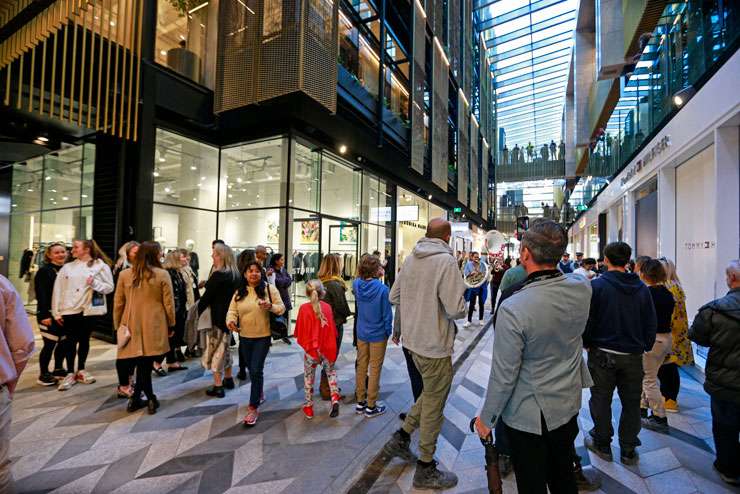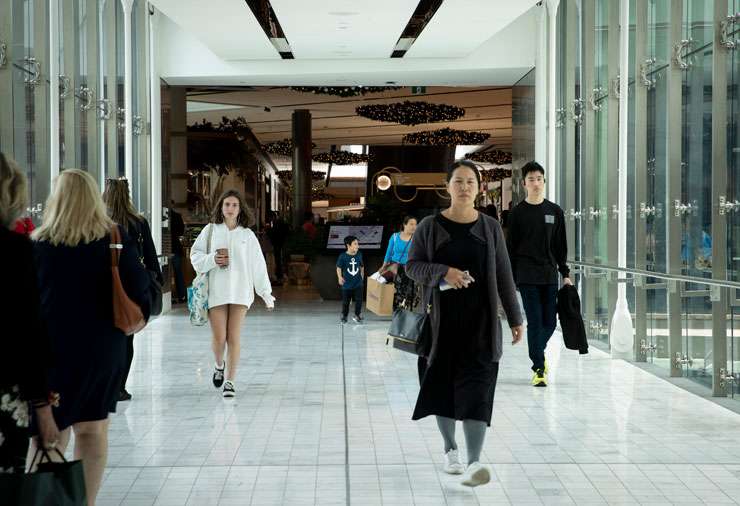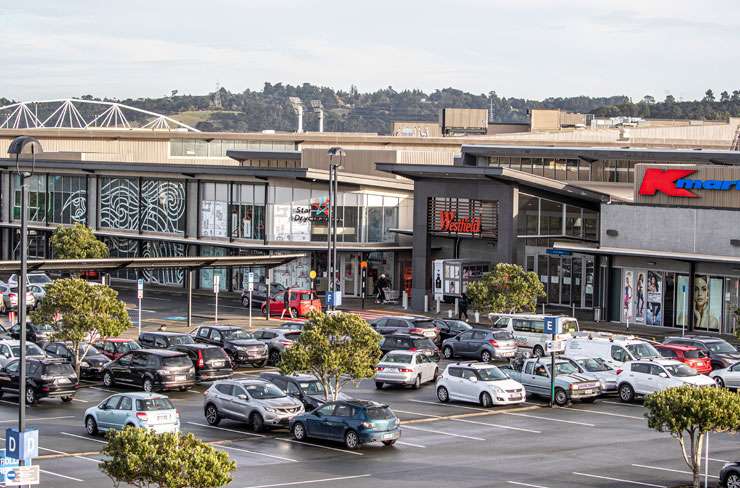The retail sector is under big pressure but will bounce back, says Nilesh Patel, head of New Zealand retail at global real estate agency JLL.
However, Kiwis should expect changes to the way they shop, especially in the big malls and suburban shopping strips.
The forecast comes as the food court in one of New Zealand’s biggest mall was shut-down after it was visited by a South Korean man who later tested positive for Covid-19.
Patel says the retail sector is adaptable but he does expect more closures of shops and chain stores in the interim as New Zealand, and the world, adjusts to the Covid-19 pandemic.
Start your property search
Big super malls, where companies have spent hundreds of millions of dollars on redevelopments, need the international tourist shoppers, some of whom who pour off cruise ships to shop while tourists others bus to malls.
According to Stats NZ, cruise ship expenditure in New Zealand for 2019 was $569.8 million, up 28 per cent from 2018, but that expenditure will be minimal this year with cruise ships banned in March.
Cracking start
Patel says while the big Commercial Bay mall in Auckland’s CBD has got off to a cracking start, retailers there, and at 277 Broadway in Newmarket, can’t rely solely on domestic shoppers.
Retail was already in over-supply in the city and these malls have brought in about 350 extra tenancies in the last 12 months.
With retail conditions already challenging pre-Covid, primarily because of the growth of online shopping, adding in a pandemic has meant a “completely changed” landscape, Patel says.

Shoppers at Commercial Bay in Auckland. The precinct opened after lockdown. Photo Alex Burton
Malls have to be more conscious of the layouts of their stores and how they provide for their customers rather than relying on the traditional racks and shelving, he says, and some malls are already providing entertainment venues and restaurants along with the food courts to entice people in for longer.
“It’s a whole ‘experience’, so coming in and possibly doing a little bit of shopping within the first half hour, having dinner within the food court and either going to watch a movie or spending time at entertainment complexes.”
Archie Brothers Cirque Electriq, an entertainment centre in the Newmarket mall, is a revelation, Patel says, with its bowling lanes, arcade and ticket games, virtual reality rides, dodgems, cocktail bar and gourmet kitchen.
“It’s an entertainment venue for the whole family to enjoy. At an entertainment venue they are there for four, five hours rather than the traditional one or two at a more traditional mall.”
Challenges ahead
But while Newmarket is offering such experiences, and Commercial Bay is “shoulder to shoulder” with domestic customers at the weekends, a question remains around sustainability.
“The international tourist, especially for the CBD, is important. It’s the life of retail and although the domestic economy is supporting these retailers just for the time being I think the further and further away the borders are from opening up it’s going to present a lot of challenges for retailers to survive long or medium term.
“With regard to Newmarket there are plans to open the luxury precinct on the ground floor which I believe is leased. The timing on opening for that is still to be confirmed but once the ground floor luxury precinct opens the only way that’s really going to survive is by the international tourist/international market. “
Big companies haven’t made a wrong call investing heavily in malls, Patel says, but they will need to look at what they focus their money on.
They will need to appeal to a wider audience and create chill-out zones, more greenery and entertainment zones.
Banks branches, for example, might have tellers at the back and a café at the front so people can have a coffee while they wait for their name to be called, and fashion stores might look to technology to enhance the shopping experience.

Westfield Newmarket in Auckland. A lot of the shops in the new mall were aimed at international visitors. Photo / Dean Purcell
“I’ve heard of, especially in the overseas market, they’re got interactive mirrors in their changing rooms that show you what a certain style will look like without having the need to try it on. I think technology is going to be quite important. There are all sorts of different ways retailers need to think.”
Operators never factored in a pandemic or a mask-wearing, socially-distanced future when developing their plans and the Melbourne outbreaks show just how easily things can take a turn for the worse.
“I think another outbreak would be an absolute disaster and could spell the end for some retailers that are just holding on.
“Overall, there is a lot more caution from all sectors of retail as to how aggressively they go with their expansion plans.”
In the suburbs, Patel predicts traditional shops may struggle as more and more people go back to their offices, saying that’s likely to lead to change in the main streets.
“You might see more real estate agencies or office space users. I think rents are going to decrease a lot in suburban areas and they will become attractive to those sorts of users who can now afford retail rents.”
Some retail sectors will remain strong, Patel says, highlighting food and beverage, supermarkets, healthcare, children’s entertainment and aged care facilities.
Paying the rent
But categories such as luxury, fashion, cosmetics and jewellery were assessing their options even prior to Covid 19.
And in the centre of Auckand some retailers have already shut their doors but are continuing to pay the rent – that’s because it’s cheaper for them to be closed and not have to pay the overheads, Patel says.
“Just for an example, you’ve got Nespresso on the corner of Queen St and Custom St who have closed their doors. They’ve still got a year-and-a-half on their lease but they’re continuing to pay rent and it’s just cheaper for them to be closed than open.
“There’s a bit of that going on at the moment. There are a handful of tenants I know have closed their doors and have leases in place, where it’s cheaper for them to remain closed.”

Westfield Albany Mall opens for business after the end of the lockdown. Photo / Michael Craig
Other tenants are trying for “Covid clauses” in their leases.
“One retailer in particular has said in the event we go back to Stage Four they don’t have to pay any rent and then a sliding scale, so if we get to Stage 3, 2 and 1 it’s a percentage they’ll pay. I haven’t come across a landlord that’s agreed to it yet but the retailers are trying.”
Patel doesn’t foresee any level of normality returning to retail until at least the second half of next year, but he also says there will always be a place for retail and has no doubt of a bounce back.
“You look at the retailers that are doing well and have survived, they’re always thinking further ahead and looking at what the consumer wants so I think retailers are smart enough to identify what consumers want and adapt accordingly.”
‘Retail is always reinventing itself’
Chris Beasleigh, Bayleys national director for retail sales and leasing, says malls are proving resilient in the face of big challenges.
“If you asked me six or eight weeks ago I would have said they were screwed but I’ve been proved wrong.”
People are out with their credit cards but it won’t be until September that retailers can really get a good handle on the situation.
Malls are becoming more of a day out for people and some mall operators will be pleasantly surprised how New Zealand has controlled the virus which means people can go out and entertain themselves.
“Over the school holidays everyone was going to them. It was winter, chucking down the rain, you couldn’t go on holiday and they were places you could go and entertain yourself, get some lunch.
“I think most of the schoolkids in Auckland were hanging round the shopping centres for the two weeks so they have proved their use. “
Retail is always reinventing itself, Beasleigh says.
“I’ve been here 17 years and everyone’s knocked retail since I arrive here, that it was going to be dead, and it’s still going on okay."
Linda Trainer, the general manager of asset management for Kiwi Property, says while Covid 19 has had a clear impact on the retail sector and there are stores under pressure, in many ways the pandemic has simply accelerated trends which were already emerging.

Nespresso on the corner of Queen St and Custom St in Auckland has closed its doors even though it has still got a year-and-a-half on its lease. Photo / Getty Images
“For example, it’s become increasingly important for retailers to offer a seamless customer experience that integrates in-store on online.
“Major retailers continue to want a presence at leading retail destinations where we’re seeing the rise of flagship stores that showcase a brand’s most exciting products.”
The best shopping centres in the best locations have so far remained resilient with visitor numbers comparable to pre-pandemic figures.
“In June, the first full month since trading resumed after lockdown, sales at Kiwi Property’s retail portfolio actually grew 7.5 per cent on an adjusted basis from the same time last year, with Sylvia Park in Auckland, The Base in Hamilton and The Plaza in Palmerston North performing particularly well.
“It’s difficult to predict what the future will bring, but we’re expecting leading shopping centres such as these to fare better through the coming months.”

















































































